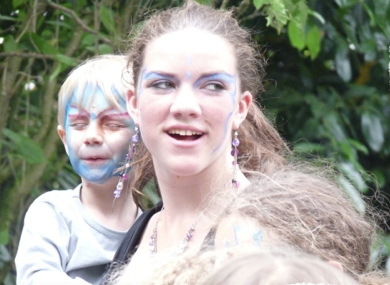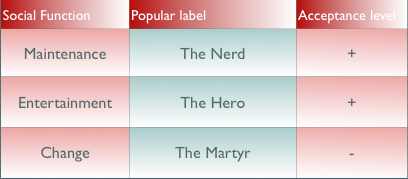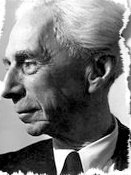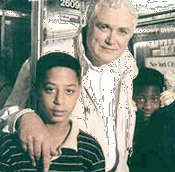 Because of the significantly different ways high-able neurodiverse children, teenagers and adults experience their inner and outer world they are part of a minority and have to find a way to express themselves appropriately without losing their sense of self in a situation with people who experience the world in a different way.
Because of the significantly different ways high-able neurodiverse children, teenagers and adults experience their inner and outer world they are part of a minority and have to find a way to express themselves appropriately without losing their sense of self in a situation with people who experience the world in a different way.
Adaptation
Often gifted children and teenagers and, maybe sometimes adults, do this by adapting apparently towards the norms and values of the majority group.
On the face of it, these gifted individuals seem to have found a way to deal with their surroundings but often, because they don’t see themselves reflected in the overall ideas  about life and society and they cannot express themselves they are not loyal to themselves. This can have considerate effects like losing their sense of self and intrinsic motivation which creates an enormous inner turmoil. This can have unwanted consequences and can lead towards serious (existential) depression or eating disorders among teenagers for which gifted teenagers are extra prone anyway.
about life and society and they cannot express themselves they are not loyal to themselves. This can have considerate effects like losing their sense of self and intrinsic motivation which creates an enormous inner turmoil. This can have unwanted consequences and can lead towards serious (existential) depression or eating disorders among teenagers for which gifted teenagers are extra prone anyway.
This enormous ability for deep experiences can in this case, if not handled well, feel like an enormous disadvantage and can often make it difficult for the direct loving environment to react appropriately to them, but those experiences can also be seen as a motivator for further personal growth, which can change perspectives.
 Social Function Giftedness
Social Function Giftedness

Humans are partly defined by their developed adaptive behaviour selected through evolutionary processes. They don’t embrace difference or strangers, to protect their own kind. This could explain the attitude towards gifted persons because people want to conserve current achievements.
Persson (2009) proposes three kinds of societal functions of giftedness: societal maintenance, executed by nerds; societal entertainment, performed by heroes and superstars who allow us to drift off from reality; and last societal change that could be executed by charismatic people with potential to achieve societal change from a deep-felt concern with humanity, known in history as martyrs.
Societal maintenance is a necessity and nowadays highly appreciated in society. Pop stars and film stars are the new gods in this global society and are highly worshipped, but those who have the potential to achieve societal change and are persuasive idealists are often stigmatised and marginalised.
The gifted with this potential for a change may be seen as a threat to positions of power and influence at all levels of society and are often seen as ‘inconvenient individuals’. (Persson, 2009)

“I wish to point out that we must allow alternative ways of thinking and dare to break away from rationalist conformism. It is not only destroying science, in my opinion, it is destroying mankind as we know it.”
“I am convinced that we more than ever need gifted leaderships, individuals who understand the working of systems and are altruistically motivated, but these are the ones who are often made martyrs by the systems they criticise!”
Roland S. Person psychologist and writer of the book ‘Heroes, Nerds or Martyrs? On giftedness and the leaderships of tomorrow.’
How do we react to our future Saviours?
“A teacher may not like to be criticised by a gifted pupil and therefore ignores him or her; a professor might not tolerate the fact that a doctoral candidate is much more brilliant than the professor and therefore holds back on information that might benefit the student; a manager might fire someone who is better suited to be manager than he or she is; a leading politician may back-stab and speak derogatorily of an opponent who seems to make better sense and have better solutions to a problem; and a regime might – as history demonstrates all too clearly – eliminate dissidents with too great a potential to topple current leaders or even the entire organisation or political system.” (Persson, 2009)

Our Future
Einstein said
“We can’t solve problems by using the same kind of thinking we used when we created them.”
More than ever this world needs people with bright brains and lots of creative and innovative out of the box thinking and imagination to find solutions for the serious problems that currently challenges humankind, like global warming, poverty, drought, the cost of food, water and warmth, etc.
We can make a difference, by stimulating the gifted and talented children and teenagers to develop their potential, to appreciate their potential despite the fact we might experience their behaviour sometimes as threatening for current norms and values.
Let’s try to remember that we do not know what we are preparing them for, the world is changing so fast it may be that the criticising teenager has a more realistic view on what is valuable to learn for the future then we have, at least let’s try to see them as a partner in their own education.
Get knowledge about how fast the world changes by looking at the video “Did you know’.

Educational Future
The value of IQ seems to be based on the assumption that scholastic achievement is a predicting success in life and the assumption that scholastic skills, as they are taught at the moment, are important for succeeding in life. However research suggests that scholastic achievement does not necessarily lead to success in life.
The school was the solution for factory owners who since the onset of industrialisation were in need of more skilled workers. To deliver skilled and reliable workers, operatives and employees, the government’s educational department put emphasis in school on practical skills like being on time, accepting long hours of mind boring activity and learning just enough information to deal with certain machines, and read and calculate enough, but not too much, so the establishment wasn’t questioned.
Hidden Curriculum
Maybe nowadays there is still a hidden curriculum preparing our children towards a not anymore existing society.
John Taylor Gatto (2002) described the hidden curriculum in his controversial lecture given on the occasion of being named “New York State Teacher of the Year” for 1991.

According to Gatto the following is taught in compulsory schooling to the pupils:
- Confusion: everything taught is out of context and unrelating;
- Class Position: knowing their place in the pecking order from dumb to clever;
- Indifference: the lesson of the bells, no work is worth finishing;
- Emotional Dependency: by use of rewards and punishments children surrender their will to the predestined chain of command;
- Intellectual Dependency: Good students wait for the teacher to tell what to do, good people wait for an expert to tell them what to do. Curiosity has no important place, only conformity;
- Provisional Self-Esteem: A child’s self-respect should depend on expert opinion;
- One can’t hide: Children must be closely watched if you want to keep society under tight central control.
Gatto (2002) emphasised that those lessons at school prevent children from learning lessons in self-motivation, perseverance, self-reliance, courage, dignity, and love – and lessons in service to others which are among the key lessons of home and community life.
What We Can Do
In the more than ever-changing society, challenged by extreme problems like the oil crisis, climate change, globalisation, poverty, it is maybe important to step away from the educational basics as they were formed in the early 1900s.
We can make a difference by trying to prepare children and teenagers for an unknown future the best way we can, by offering them the necessary skills to adapt to an ever-changing world.
Emotion Regulation
Multilevel Emotion Regulation Theory (MERT) is a holistic theory developed by Simone de Hoogh. The theory explains how neurodiverse (young) individuals and parents of neurodiverse children can develop emotional regulation skills and direct their energy towards self-chosen goals, and contribute to society.
PowerWood’s Community
Find understanding, tools and strategies that work in an understanding, respectful and compassionate Community.
PowerWood can be your and your families advocate and your second family.
Explore how joining our PowerWood community by becoming a member will benefit you and your family and what types of memberships are available.
Join our Community
Available to Members*
*Booking a one-off Free Introductory Talk of 45-60 minutes by Skype or FaceTime with Senior Consultant Simone de Hoogh is one of the benefits of being either a FreeBee PowerWood Community Member or a Friend PowerWood Community Member.
Book a FREE Introductory Talk with a Professional*
You can read more about PowerWood’s Consultancy Sessions, the Benefits of a Free Introductory Talk and PowerWood’s Consultancy Services Tiered Fee Structure.
*Overexcitability Test
OE (Overexcitability) is an element of a Developmental Theory –Theory of Positive Disintegration by Dabrowski- that is one of the underpinning theories of MERT (Multi-level Emotion Regulation Theory) developed by Simone de Hoogh. Overexcitability explains and allows us to look at ‘extreme’ behaviour as a valuable asset in our or our children’s life.
Find out if you or your child has OE (OverExcitability) as well
*Boundary Test
A HUGE thank YOU to the son and daughter of Ernest Hartmann’s who gave PowerWood permission to use and put the full academically approved questionnaire about the Boundary in the Mind on PowerWood’s website.
Find out how the Boundary in the Mind affects you or your child
